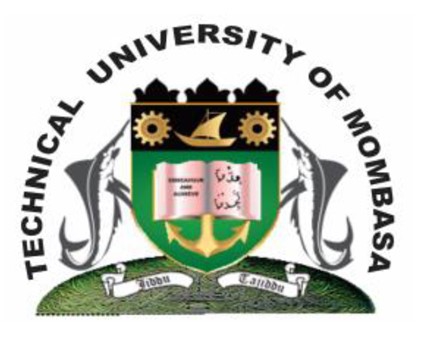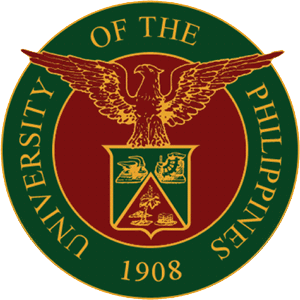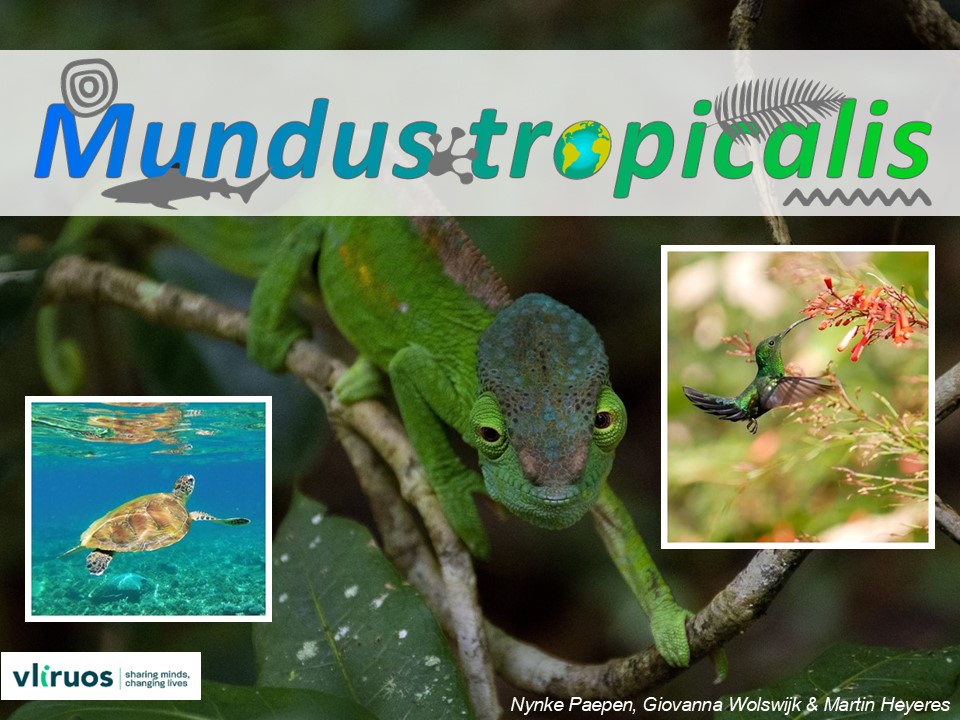Full Partners: Teaching Core Partner Universities

VUB - Vrije Universiteit Brussel (Belgium)

ULB - Université Libre de Bruxelles (Belgium)

TUM - Technical University of Mombasa (Kenya)

UP - University of The Philippines Diliman (Philippines)

SU - Sorbonne Université (France)

MNHN - Muséum National d'Histoire Naturelle (France)

UNIFI - Università degli Studi di Firenze (Italy)

UdG - Université de la Guyane Française (French Guiana)
Programme

TROPIMUNDO is an EC-funded and excellence-labelled Erasmus Mundus Joint Master (Degree) in Tropical Biodiversity and Ecosystems, with co-financing from VLIRUOS for Mundus tropicalis, the Trajectories running through Kenya and the Philippines. We aim to bring together expert Higher Education Institutes (HEI), with long-standing worldwide expertise in tropical rainforests and woodlands and in tropical coastal ecosystems. TROPIMUNDO and Mundus tropicalis students can concentrate on botany, zoology and integrative ecosystem approaches in institutions with and beyond Europe in 2 Master years, of which an entire semester is spent in the tropics. Specialisation is possible on the evolution of tropical flora and vegetation, on faunistic assemblages, on informatics tools to treat and manage biodiversity data and databases (biogeographical, genetical, geographical information systems) including the management and conservation of historic collections such as herbarium sheets, on the study of diversity, dynamics and evolution of tropical and subtropical ecosystems (with a focus on four related systems, namely tropical rainforests and woodlands, mangrove forests, seagrass beds and coral reefs, including the interactions between flora, fauna, man and the environment within and between each of these adjacent ecosystems), on conservation and restoration ecology of natural habitats and their biodiversity including competences in sustainable management and governance of biodiversity, and finally, on tropical ethnobotany, exploitation and valorisation of natural resources and conservation of traditional ecological knowledge.
Click here to go to the TROPIMUNDO website and get your personal link to the online Information and Application Module.
 The information in this website may be subject to changes from one year to another.
The information in this website may be subject to changes from one year to another.Application
The second call for self-funded applicants intending to start their studies in academic year 2026-2027 will open in January 2025.
Detailed information on TROPIMUNDO facts, conditions, procedures, deadlines, etc... is available in the online Information and Application Module.
The first TROPIMUNDO call is for scholarship seekers or self-funded applicants and will be evaluated as a batch after the deadline in November 2025. If available places remain a second call will be opened and applications will be treated on a first come first served basis. The second call for TROPIMUNDO applications from self-funded applicants from all countries will be open until the deadline of 30 April of 2026. After this date the call will remain open only for self-funded applicants from Programme Countries until 28 June 2026. The second call will remain open until all available places have been attributed.
Admissions may be done conditional of obtaining a Bachelor diploma or language proof before the start of the academic year.
The next scholarship call or applicants intending to start in academic year 2027-2028 is expected to open in October 2026.
Click below to get your personal account to the online Application, Information and Management Tool:
FREQUENTLY ASKED QUESTIONS - FAQ
Tweets TROPIMUNDO
Kenya
Philippines
Core values
- This Master's programme (120 ECTS) trains global students to become the future transdisciplinary scientists, conservationists, managers and policy-makers who will make a difference for the tropical ecosystem functions, goods and services on which their home countries and regions depend.
- The core values and learning competences are entirely integrated in the Erasmus Mundus Joint Master in Tropical Biodiversity and Ecosystems - TROPIMUNDO.
Joint Master Degree
Upon graduation students will be awarded a Joint Master degree by the European institutes visited by the student. In addition, each student will receive a Europass Certificate signed by all participating higher education institutes involved.Find out the legal provisions of the degree-awarding institutions (this also includes a summary description and detailed course descriptions of graduated student cohorts)
Basic student requirements
- An internationally accepted Bachelor in Science degree (i.e. equivalent to 180 ECTS) with a major in Biology, Natural Sciences, Environmental Sciences, or equivalent from an accredited university. Prospective applicants should check the FAQ to see which BSc are likely to be considered equivalent and which are not;
- Students must be able to demonstrate proficiency at least in English, and depending on the second year Trajectory possibly also in French. However, in the 1st and 3rd semester extra-curricular language courses are offered to improve language skills needed on the student's study Trajectory.
- Eligibility criteria related to 'Nationality and country of residence', 'Age', 'Professional background and experience', 'Scholarship applications' and 'Previously awarded scholarships', all of which are detailed on the VLIRUOS website: https://www.vliruos.be/en/icpconnect-scholarships
- A personal evaluation of the applications will be done by the Selection Committee composed of all Local Coordinators.
- More information on requirements can be found in the online TROPIMUNDO Application, Information and Management Tool (AIM-tool);
Trajectory in 4 semesters
The consortium is composed of 9 higher education institutes in EU Member States and 7 in Third Countries not affiliated to the Erasmus+ Programme. In a first semester, students start in Brussels to acquire similar competences. In a second semester field experience and courses will take place in a university in a tropical region, Kenya or The Philippines for Mundus tropicalis. The third semester will cover a specialisation in a European university different from the first semester. The fourth semester is dedicated to the MSc Thesis and students return to where they started out. Every Trajectory of 4 semesters constitutes a unique combination of courses and expertises.
In-depth information available from the TROPIMUNDO website.
Tuition fees
Tuition fees are 9,000 EUR per year for students from Third Countries not associated to the Erasmus+ Programme (largely outside Europe) and 4,500 EUR per year for students from EU Member States and Third Countries associated to the Erasmus+ Programme (largely in Europe). Self-funded students will receive a restitution of 500 EUR for each 4500 EUR paid. VLIRUOS Scholarship Students will receive a Tuition Fee Waiver so the lowest applicable rate is provided by the institution that runs the programme. Tuition fees are to be paid to the TROPIMUNDO coordinating institute an include consortium enrolment fees and the insurance cost. The tuition fees do not include costs related to visa and preparatory documents, accommodation, additional insurance costs, living expenses and travel and transportation costs. However, VLIRUOS-funded students have additional cost coverage. Find more information here.Scholarships
Mundus tropicalis candidates from a limited list of VLIRUOS Priority Countries can also apply for a VLIRUOS Scholarship. Applicants from all nationalities can also apply for an Erasmus Mundus scholarships (pending approval by the EC). Please visit the TROPIMUNDO website for more information.
Applying for TROPIMUNDO and Mundus tropicalis
All applications for Mundus tropicalis and TROPIMUNDO are streamlined and run exclusively through the online TROPIMUNDO Application, Information and Management tool available from the TROPIMUNDO website, which also includes a Frequently Asked Questions (FAQ) section.Awards & Laureates
Students & Alumni

As the first edition of Mundus tropicalis will start in September 2025, the first graduates will be announced from September 2027 onwards.
Coordinators
Participating universities and local coordinators
All institutes in the consortium are internationally-minded institutions with infrastructure, experience and proven results in servicing foreign students and scholars. The Local promoter or Coordinator, assisted by a Local Administrative Manager, will be the single contact point for students in all matters and will act as liaison between students and the administrative departments at their institution. All European institutes also have an International Relations Office that is used to guide foreign students and researchers, providing necessary material to help them find their way in the full program. The consortium aims to meet the highest quality requirements. More information on programme quality and evaluation is available from the Online Application, Information andManagement Tool, or in case of additional questions not indicatd on the website, through e-mail (info@mundustropicalis.eu).Consortium
S = Semester- S1/S3/S4. Université Libre de Bruxelles - ULB and Vrije Universiteit Brussel - VUB (Belgium)
Managing Director and Belgian Promoter: Farid DAHDOUH-GUEBAS
Founding Director: Farid DAHDOUH-GUEBAS (anno 2012 for TROPIMUNDO) - S1/S3/S4. Vrije Universiteit Brussel - VUB (Belgium)
Belgian Co-Promoters: Iris STIERS and Tom VAN der STOCKEN - S2. Technical University of Mombasa - TUM (Kenya) for East-African svannas, Great Lakes and coastal ecosystems
Local Co-Promoter: Cosmas Nzaka MUNGA - S2. Unibersidad ng Pilipinas - UP (Philippines) for Westeran Pacific terrene, palustrine and marine ecosystems
Local Co-Promoter: Severino G. SALMO III - S3. Sorbonne Université - SU (France)
Local Coordinator: Jean-Yves DUBUISSON - S3. Muséum National d'Histoire Naturelle - MNHN (France)
Local Coordinator: Nathalie BECKER - S3. Università degli Studi di Firenze - UNIFI (Italy)
Local Coordinator: Giacomo SANTINI - S3. Université de Guyane - UdG (French Guyana, France)
Local Coordinator: Sabrina COSTE
Links
- VLIRUOS
- The European Commission’s Erasmus+ Programme
- Erasmus Mundus Joint Master in Tropical Biodiversity and Ecosystems - TROPIMUNDO
- Master International en Biodiversité et Environnements Tropicaux (BET) formerly named Biodiversité et Environnements Végétaux Tropicaux (BEVT)
- International Course Programme: MSc. in Marine and Lacustrine Science and Management (Oceans & Lakes)
- Master of Science in Biology
- Intergovernmental Panel on Climate Change (IPCC)
- International Union for Conservation of Nature (IUCN)
- The Ramsar Convention on Wetlands
- United Nations Educational, Scientific and Cultural Organization (UNESCO)
- United Nations Environment Programme (UNEP)
Network/Associate Partners

 Disclaimer | FAQ | Information relating to individuals (personal data) is collected and used in accordance with the regulation(EU) 2016/679on the protection of natural persons with regard to the processing of personal data and on the free movement of such data, and repealing Directive 95/46/EC
Disclaimer | FAQ | Information relating to individuals (personal data) is collected and used in accordance with the regulation(EU) 2016/679on the protection of natural persons with regard to the processing of personal data and on the free movement of such data, and repealing Directive 95/46/EC(General Data Protection Regulation) of the European Parliament and of the Council of 24 October 1995 (Official Journal L 281 , 23/11/1995 P. 0031 – 0050) | GDPR info:GDPR@tropimundo.eu| General info:info@mundustropicalis.be| Latest update:








